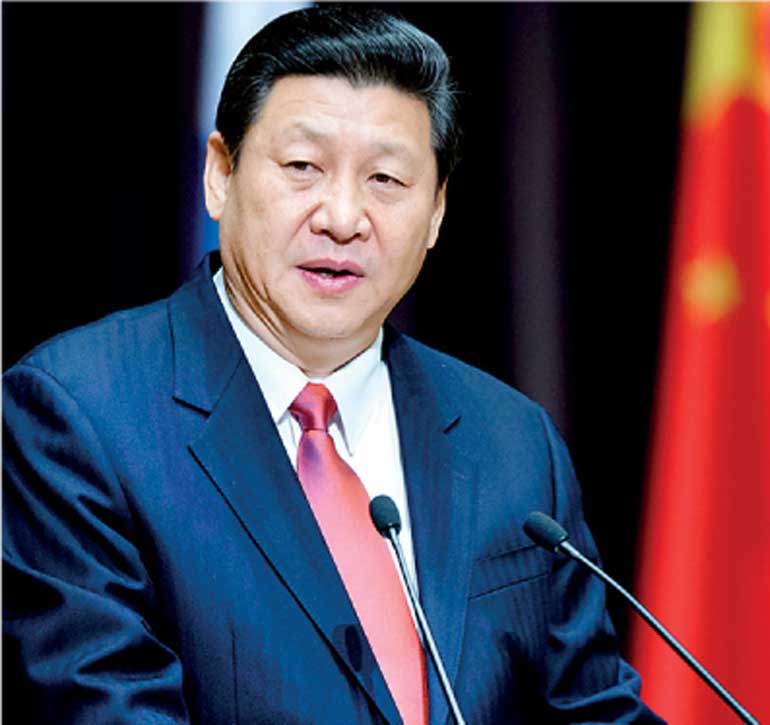Tuesday Feb 24, 2026
Tuesday Feb 24, 2026
Tuesday, 30 August 2016 00:01 - - {{hitsCtrl.values.hits}}
 Chinese President Xi Jinping
Chinese President Xi Jinping
By Zhang Huizhong from the People’s Daily
The 11th G20 Summit will be held in Hangzhou on 4 and 5 September. Since it was announced that China will be holding the 2016 G20 Summit at the 2014 Brisbane G20 Summit, Chinese President Xi Jinping has commented at length on the G20 Hangzhou Summit, elaborating on China’s vision for the meeting while offering advice on the development of the G20, the world economy and global economic governance.
China is confident to fulfill its role as the chair of the 2016 G20 summit and a member of the three-member management troika for 2015 and 2017, and will work with all other parties to earnestly maintain, build and develop the mechanism of the G20.
(16 November 2014, at the second session of the Brisbane G20 Summit)
Based on the current situation and the expectations of all concerned, China has chosen the theme ‘Towards an Innovative, Invigorated, Interconnected and Inclusive World Economy’ for the 2016 Summit. We hope to continue work for the Summit in four key areas:
First, we must transform growth patterns in innovative ways, with a particular focus on pursuing reform and innovation. We must create and seize new opportunities to increase potential for global economic growth.
Also, we need to improve global economic and financial governance, increase representation of emerging markets and developing countries, and enhance capacity of the global economy to ward off risks.
Third, we need to promote global trade and investment to generate growth and build an open world economy.
Lastly, we must promote inclusive and interconnected development, strive to implement the 2030 Agenda for Sustainable Development, eliminate poverty, and achieve common development.
(16 November 2015, at working luncheon of the Antalya G20 Summit)
G20 is now facing a transformation from a mechanism of crisis response to one of long-term governance. As its agenda items shift from short-term issues to deep-seated and longer-term ones, the necessity for and difficulty of macroeconomic policy coordination and enhanced cooperation among G20 members have both increased. We need to act in the spirit of partnership to work for the smooth transformation of the G20 and the consolidation of its role as the premier forum for global economic governance.
(16 November 2015, at working luncheon of the Antalya G20 Summit)
The G20 belongs to each and every one of its members. In preparing for the Hangzhou Summit, China will consistently follow an open, transparent and inclusive approach, and strengthen communication and coordination with all other members to jointly uphold, strengthen and develop the G20.
(16 November 2015, at working luncheon of the Antalya G20 Summit)
The G20 was set up at the height of the international financial crisis in 2008, demonstrating the determination of members to put the global economy back on its feet. The G20 thus became the premier forum for international economic cooperation. Looking back, I believe that the most valuable thing this process has created is the close partnership we have forged that has enabled us to jointly tide over a difficult time. It proves that in a world of deepening economic globalization, cooperation is the sure way for countries to meet challenges and achieve common development.
(30 November 2015, speech on the 2016 G20 Hangzhou Summit)
As an important forum for cooperation among developed countries, emerging markets and developing countries, the G20 plays a key role in leading and advancing international economic cooperation. It should act with a broad vision and deliver concrete outcomes. It should address critical issues affecting the global economy and endeavor to promote strong, sustainable and balanced growth.
(30 November 2015, speech on the 2016 G20 Hangzhou Summit)
We should embrace the vision of a global community of a shared future, enhanced economic connectivity and exchanges among countries and improved global economic and financial governance so as to address inequality and imbalance in global development and ensure that the benefits of economic growth will be equitably shared by people of all countries.
(30 November 2015, speech on the 2016 G20 Hangzhou Summit)
In the course of making preparations for the 2016 G20 Summit, China will work with all involved in the spirit of win-win cooperation. We should pool our wisdom, form A synergy, implement the outcomes of the Antalya Summit and all previous summits, and jointly advance international economic cooperation.
(30 November 2015, speech on the 2016 G20 Hangzhou Summit)
China will push forward the 2030 Agenda for Sustainable Development by pushing the G20 Summit to focus on development and promoting the joint-construction of the ‘Belt and Road’ initiative.
(7 July 2016, meeting with UN Secretary-General Ban Ki-moon in Beijing)
G20 is a major platform for global economic governance. Under the current circumstances, as the world’s two largest economies, China and the US should closely cooperate, jointly push the G20 Hangzhou Summit for positive results, spread confidence across the world and inject impetus into global economic growth.
(25 July 2016, meeting with Assistant to the US President for National Security Affairs Susan Rice in Beijing).